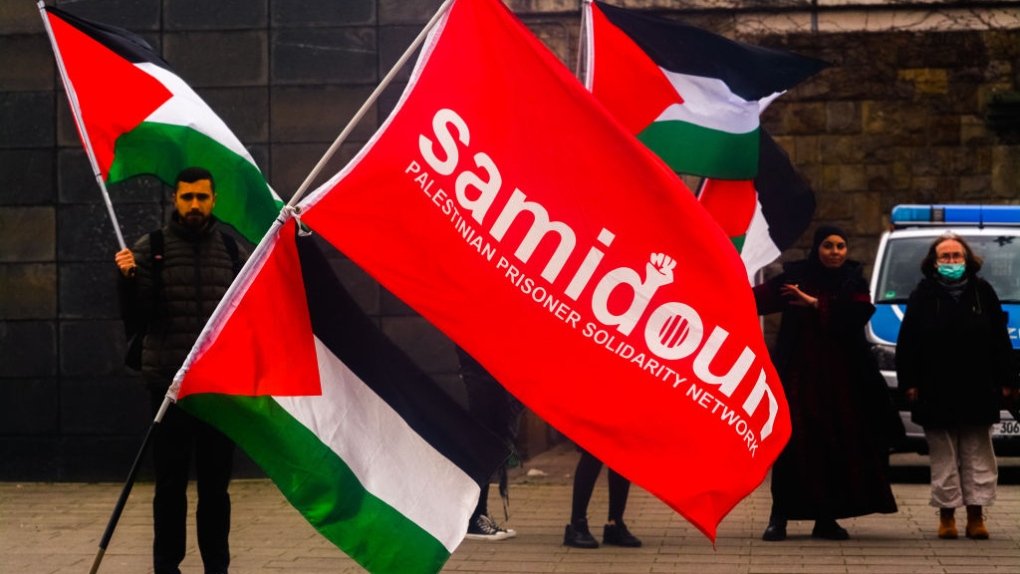Samidoun: The Terrorist Organization Next Door
(Ying Tang / NurPhoto via Getty Images)
Executive Summary
Samidoun, a pro-Palestinian group with ties to the Popular Front for the Liberation of Palestine (PFLP), has been designated as a terrorist organization by Canada, the United States, and several European nations. The group's actions, including the promotion of violent extremism and financial support for terrorism, have raised concerns about its global influence. Through protests, fundraising, and vocal support for groups like Hamas and Hezbollah, Samidoun has positioned itself as a significant player in the promotion of anti-Israel terrorism, operating under the guise of humanitarian aid.
Analysis
Samidoun, also known as the Palestinian Prisoner Solidarity Network, was formed in 2011 in response to a hunger strike led by Palestinian prisoners, many of whom were affiliated with the Popular Front for the Liberation of Palestine (PFLP). The group has since grown into a global network, with chapters across the United States, Canada, and Europe. While it presents itself as an organization advocating for the rights of Palestinian prisoners, multiple governments have revealed that Samidoun operates as a fundraising arm for the PFLP, a designated terrorist entity in Canada, the United States, and several European countries.
Recent designations have shed light on the group’s activities. On October 15, 2024, Canada officially listed Samidoun as a terrorist entity under its criminal code. This designation came after a review by national security advisers, prompted by concerns over the group’s ties to the PFLP and its involvement in violent extremism. Simultaneously, the U.S. Treasury Department added Samidoun to its list of specially designated global terrorists, citing its role as a "sham charity" that funnels financial support to terrorist activities. The U.S. also sanctioned Canadian citizen Khaled Barakat, a senior figure in the PFLP and a key organizer within Samidoun.
Samidoun's public rhetoric has also become increasingly militant. During protests and public statements, the group has explicitly praised violent actions against Israel, including the October 7, 2023, Hamas-led attacks. Samidoun’s leadership, including Charlotte Kates and her spouse, Khaled Barakat, have openly celebrated acts of terrorism, describing them as "heroic" and a necessary part of the Palestinian liberation struggle. The group’s vocal support for these attacks, combined with its involvement in organizing rallies where participants chant slogans like "death to Canada" and "death to Israel," has solidified its reputation as an advocate for violent extremism.
Furthermore, Samidoun’s influence extends beyond mere rhetoric. The group has been directly linked to the organization of pro-Hamas and anti-Israel protests in North America and Europe, many of which have escalated into violent confrontations. In Vancouver, police launched an investigation into a Samidoun rally where participants burned Canadian flags and expressed solidarity with known terrorist organizations, including Hezbollah and Hamas. These rallies, often marked by calls for the destruction of Israel and violent opposition to Western governments, demonstrate Samidoun’s active role in fostering extremism,
The group’s operations also extend into financial networks. According to U.S. officials, Samidoun masquerades as a charity to solicit donations that are then funneled to support terrorist activities. This includes providing financial aid to groups like the PFLP and Hamas, both of which have been implicated in numerous attacks on civilians. The U.S. and Canadian governments have moved to block Samidoun’s financial activities, with assets being frozen and banks instructed to prevent any transactions related to the group. Despite these efforts, Samidoun’s global network remains active, particularly in Europe, where it continues to organize rallies and solicit funds under the pretense of humanitarian aid.
In Germany, the government took further steps in October 2023 by banning Samidoun outright. This action followed an incident where the group distributed sweets in celebration of Hamas’s attack on Israel. Germany’s domestic intelligence agency has since closely monitored the group’s activities, citing its role in inciting violence and promoting terrorist ideologies. Samidoun’s international presence, particularly its connections with Iran and Hezbollah, has further complicated efforts to contain its influence.
Samidoun’s ties to other extremist organizations further deepen the concern. The group has maintained close relationships with groups like the Houthis in Yemen, Hezbollah in Lebanon, and Hamas in Gaza. These connections have facilitated Samidoun’s ability to promote anti-Israel propaganda and provide logistical support for terrorist activities. Its leaders, including Kates, have met with prominent figures from these organizations, further solidifying Samidoun’s role as a conduit for global extremism. Kates herself accepted an award from the Iranian government in 2024, further showcasing the group’s close ties with Tehran.
Final Thoughts
Samidoun represents a growing threat as it continues to mask its operations under the guise of humanitarian aid while actively promoting terrorism and violent extremism. The recent terrorist designations by Canada, the U.S., and Germany highlight the seriousness of its activities and the need for international cooperation to dismantle its networks. As Samidoun persists in its efforts to spread violent ideologies, it remains a critical focus for governments seeking to curb the influence of terrorist organizations in Western societies.
Sources
https://www.adl.org/resources/article/samidoun-what-you-need-know
https://www.reuters.com/world/germany-bans-pro-palestinian-group-samidoun-2023-10-12/
https://globalnews.ca/news/10812072/samidoun-canada-terrorist-entity/
